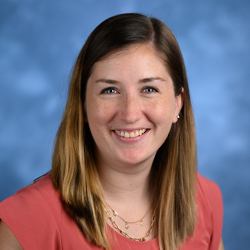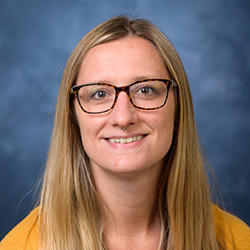Residency: Anatomic Pathology
The NC State Anatomic Pathology Residency Program provides advanced training in veterinary pathology and a solid foundation to become a competent pathologist. The program prepares residents for diverse career opportunities including but not limited to academia, industry, government, and diagnostic pathology positions. Training emphasizes preparation for certification by the American College of Veterinary Pathologists and personalized training experiences that align with career goals. Pursuit of specialized career paths and post-residency advanced degrees is encouraged.
Completion of this program will fulfill the prerequisites for the Anatomic Pathology Board Certification Examination by the American College of Veterinary Pathologists.
NC State trains anatomic pathology residents through a 3-year traditional residency program:
Our 3-year Traditional Residency Program provides advanced training in veterinary anatomic pathology and prepares residents for diverse career opportunities. This program builds a solid foundation in pathology training and allows residents to explore diverse areas of pathology specialization, to build unique expertise, and to create a competitive career portfolio in an area of pathology they love. Residents are trained in an apprenticeship style under eight boarded anatomic pathologists, while rotating through necropsy and biopsy services, where residents encounter a great breadth of species (e.g., dogs, cats, equine, ruminants, exotics, aquatics, zoo) and cases. Training on service is supplemented by a variety of rounds including histopathology seminar, gross image rounds, gross necropsy rounds, journal club, and other specialty rounds. Residents are supported to pursue special areas of interest and develop unique expertise through externship opportunities, workshops, conferences, specialized service, and research projects. Trainees are encouraged, if interested, to pursue post-residency MS or PhD advanced degrees that match their career goals.
NOTE: This residency does NOT participate in the residency matching program VIRMP. Applications typically open in July and close the following October (see below).
Program
Anatomic pathology residents are trained in the morphologic pathology of food, companion, laboratory, aquatic, equine, avian and exotic animals. Resident’s major activities include performing necropsies and examining surgical pathology specimens, under the supervision of an ACVP board-certified anatomic pathologist. Faculty pathologists have specialties in aquatics/fish, zoo/exotics, swine, oral, and ocular pathology as well as pedagogy and viral oncogenesis. Integration of pathologic findings with patient history, clinical findings, clinical pathology data, microbiology, immunology, toxicology, and other ancillary studies is emphasized. Residents will participate in necropsy rounds, gross image rounds, histopathology rounds, and journal club as important components of the program. Residents will be exposed to related disciplines by selecting specialized rotations in areas such as poultry pathology, electron microscopy, toxicological pathology, clinical pathology, or research. Trainees are strongly encouraged to pursue a research project and to become involved in the anatomic pathology teaching curriculum for veterinary students. Residents may elect rotations or short externships at one of the variety of government and private research institutions or the diagnostic lab in the Research Triangle area. Residents attend regional and national meetings to present cases and their research projects.
Stipends and Benefits
Stipend levels depend on the program. Stipends begin at $54,000 with benefits for NC State training positions and cover 3-years of training. More details about house officer benefits can be found here.
Mentorship
Anatomic pathology residents select a three-member residency advisory committee composed of two pathologists and one non-program faculty member, selected to meet the academic interests of the resident. Residents meet with their committee at least biannually for career and residency guidance. Pathology case training, guidance, and mentorship occurs daily to weekly as there is ample discussion with faculty about pathology principles and practice. Incoming residents are also assigned a second- or third- year resident as a resident mentor.
Graduate Training
Diverse opportunities are available to residents choosing to pursue graduate training after residency. Residents planning a Ph.D. degree will be encouraged to identify mentors and to seek graduate stipend support during the residency period. Graduate studies at North Carolina State University may be pursued in one of a variety of areas including toxicology, carcinogenesis, oncology, infectious diseases, immunology, cell biology, pathology, physiology and microbiology. In addition to NC State University, research training opportunities are available at several institutions in the Research Triangle Park, including the National Institutes of Environmental Health Sciences, as well as the University of North Carolina School of Medicine and Duke University School of Medicine. Graduate programs are organized through NC State University and the research can be done in laboratories at the various institutions.
Candidate Selection
The residency program directors will coordinate the selection process and will review candidate material with anatomic pathology faculty. Applications will start to be reviewed in October of the year preceding an open July position. Occasionally positions become available at alternate times depending on funding availability. Select candidates may be offered a virtual interview (Zoom) as part of the application review process. Candidates are encouraged to visit the program in person at their own expense in the 9-months preceding an application deadline. Please contact Dr. Abigail Armwood (arwisnet@ncsu.edu) if interested in organizing a visit or externship.
Questions About the Program
Please send questions by email to Dr. Abigail Armwood (arwisnet@ncsu.edu) or Dr. Elizabeth Rose (ecrose2@ncsu.edu), the Anatomic Pathology Residency Program Coordinators.
Leadership and Faculty
Program Leadership:
Program Faculty:
Head of the Department of Population Health and Pathobiology
919-513-6279 ksakamo2@ncsu.eduApply
The program is not part of the residency matching program. Applicants must possess a DVM or equivalent AVMA-recognized degree. Applicants must submit:
- Letter of intent stating career goals
- Curriculum vitae
- Official veterinary school transcripts
- Three reference letters submitted via the reference form available in the link below
- GPA or class rank (can be listed on transcripts, stated in CV, or in alternative format such as a Dean’s letter)
In addition, foreign graduates of countries where English is not the official native language should include official transcripts of TOEFL scores. In addition to submitted application material above, NC State University training positions and NC State University / Partnership training positions must fill in application material online through human resources at NC State University and an active web-link will be present when a position is open. All open program positions are dependent on available funding, which fluctuates from year to year.
Applicants should apply to a specific position announcement, follow specific program position announcement deadlines for application, and send original documents. Open position announcements can be found by clicking the apply button below.
Applications for 2026-2029 anatomic pathology residency positions are currently open, and applications will be given full consideration if submitted by September 22, 2025: https://jobs.ncsu.edu/postings/220203
Information for International Applicants
Preference is given to applicants who have graduated from a college that is accredited by the American Veterinary Medical Association. If you wish to apply for an internship or residency program, here are things to keep in mind:
- Have your degree translated and evaluated by a reputable company. If the degree that qualifies the employee for the position is from any institution outside the US, it will need to be evaluated for US equivalency. Options include World Education Services (WES) and the Foundation for International Services (FIS).
- Some programs may require the TOEFL exam to qualify for an internship or residency position.
- Foreign national interns and residents are appointed to H-1B visas.
- To ensure that a foreign national candidate has the H-1B visa at the start of their program the candidate can be asked to pay the premium processing filing fee of $2,805 USD.
- Visa processing generally takes between 4 and 6 months however if the visa is expedited it takes approximately 15 business days.







